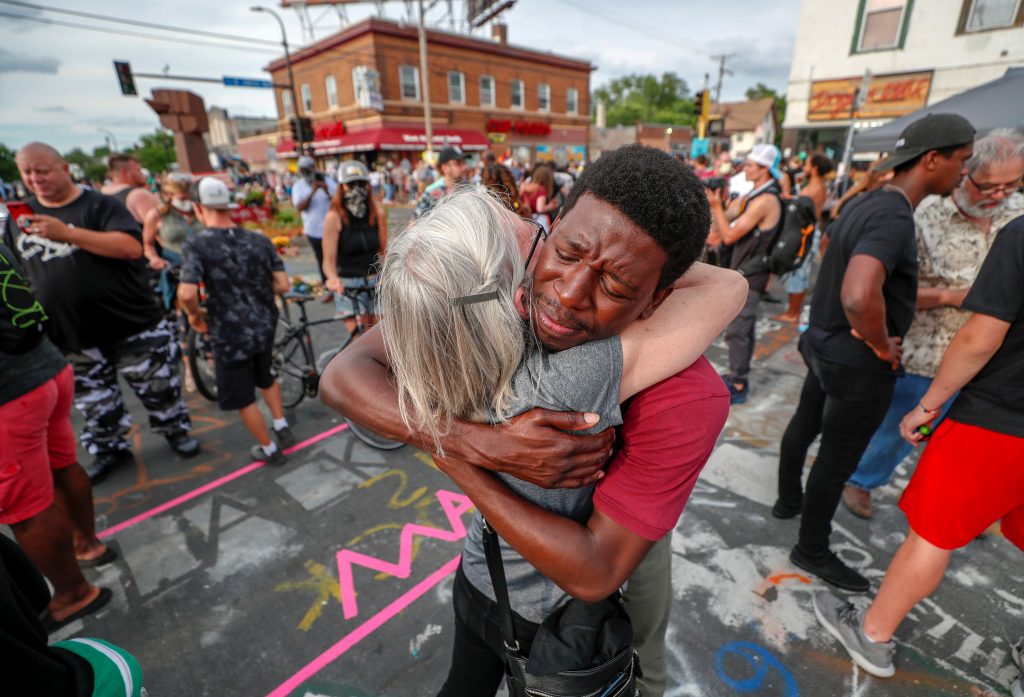One day in early June, John Thordarson released a short video he had finally finished. Under a black and white filter, the aspiring filmmaker from Boston walks on screen and takes a long pause before he begins.
“This video took me a really long time to make,” he says. “With everything that’s been going on … I feel like it’s important to say something, but I wasn’t quite sure what that something was.”
“That something” Thordarson was seeking to express was in response to the death of George Floyd, an African American man who died May 25 after being pinned down for nearly nine minutes by a Minneapolis police officer.
Floyd’s death, captured in a video posted on social media, sent shock waves across the country and the world, as thousands of protesters took to the streets to express their outrage. The protests, sometimes turning violent, exposed long-simmering issues of racial unrest, from economic inequalities to institutional injustices to prejudice within communities, including, at times, the Catholic Church.
After half a dozen attempts at writing a script, Thordarson continues, “I realize that what’s really important right now is that we have conversations.”
To start that conversation, he decided to share the story of his parents, an African American woman and an Irish American man who fell in love and married in a time of segregation.
“It just felt right,” he told Angelus about his decision to tell this story. “It dealt with things that are happening … [but] the nice thing about stories is that if people can relate to a story, it doesn't pass judgment on them.”
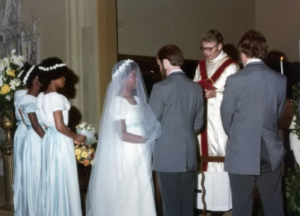
Told through photographs and Thordarson’s narration, the film does not address the events surrounding Floyd’s death directly. Rather, it highlights a relationship in which love triumphed over an environment steeped in prejudice.
“The whole reason that [my parents] got married is because they didn't look at each other as what they were supposed to be,” said Thordarson. “They just looked at each other as people.”
For Paul Thordarson, his father, that moment of encounter is especially important for Catholics, who are called to spread hope and joy.
“[The faith] is not a bunch of negatives,” he told Angelus, “but rather living the Christian life … a life of love.”
Amid the turbulence since Floyd’s death, such words point to a message of healing that the Catholic Church can offer its faithful — and the rest of the world. But in the age of social media and so-called “cancel culture,” what real-life problems is that message supposed to address, and what kind of action does it lead to?
Gloria Purvis was barely able to get through watching the video of Floyd’s arrest.
“It’s trauma,” she told Angelus. “And I wish almost I hadn't seen it.”
As a Catholic, pro-life activist, and black woman, Purvis, a host for EWTN’s “Morning Glory,” felt the tragedy cut her to the core. In a June 5 panel organized by Georgetown University, she likened the experience of watching the video to “watching an abortion.”
Since then, Purvis has faced another source of pain: the sense of disconnection from many of her fellow Catholics.
“It’s been bewildering,” she said, “from the shock … [and] the feeling of betrayal when you see prominent white Catholics who claim to be pro-life saying and doing everything to deflect away from dealing with the issue of police brutality and racism as it affects the black community.”
She’s not alone in feeling this way. “I’m hearing from so many Catholics of color,” she added. “Black, Mexican … my Latino brothers and sisters … I’m hearing from the Pan-African diaspora of Catholics that they feel betrayed.”
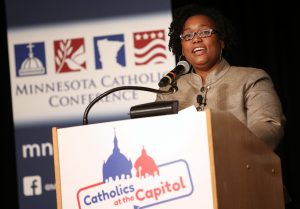
One source of division could be politics. Purvis suspects that some of her fellow pro-life Catholics are concerned about securing votes in the November elections and therefore emphasizing the abortion crisis at the expense of much-needed dialogue on the ugly reality of racism.
Louis Brown, executive director of the health care nonprofit Christ Medicus, thinks the two issues are not mutually exclusive. Brown, a Michigan lawyer who has previously worked as a staffer and adviser to various congressmen, described the pressure to support either the anti-abortion or anti-racism causes as a “false choice.”
“Both abortion and racism are part of the culture of death,” he told Angelus. “The right to life beginning with the unborn is the preeminent social issue of our time because of its gravity. But fighting against racism is an outgrowth of fighting to advance the right to life.”
Brown’s words echo those found in the Catechism of the Catholic Church’s condemnation of racism as one of the forms of discrimination that “must be curbed and eradicated as incompatible with God’s design.”
Some have pointed out that Catholics have not always practiced what the Church preaches on racism. Cases like that of Georgetown University, whose Jesuit priest leader traded slaves to keep the Catholic school afloat, mark a legacy of ties to that very evil the Church has sought to fight throughout the centuries.
It’s also no secret that racism has been an unfortunate reality in Catholic seminaries in the U.S. While a student at Conception Seminary College in the 1960s, now-Supreme Court Justice Clarence Thomas recalled the racial prejudice that buffeted him on a regular basis, including the biting comment from a white seminarian after Rev. Martin Luther King Jr. had been shot: “Good — I hope the SOB dies.” Such racial hatred drove Thomas from the seminary and, for a period, from Catholicism entirely.
Father Matthew Hawkins spent 20 years working in community economic development and teaching at several schools, including the University of Pittsburgh. On June 27, he was ordained a priest for the Diocese of Pittsburgh at the age of 63, the culmination of a journey that began when he converted from Protestantism in his youth.
Still, the first remedy that comes to the former social worker’s mind for healing racism may come as a surprise.
“I think as Catholics, we’re required to approach these kinds of controversies with wisdom,” he told Angelus, “which means that what should inspire our action is really to enter into a life of prayer — and the type of prayer that increases empathy.”
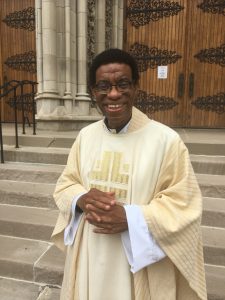
In the face of tragedy, Father Hawkins believes prayer is crucial because it helps us feel accompanied in suffering. He personally encourages his parishioners to pray the Sorrowful Mysteries of the Rosary and the Stations of the Cross.
By doing so, “You’re entering into the passion of Christ and identifying with the suffering of all humanity, which creates a sense of solidarity in human suffering.”
The steps which those prayers lead to, said John Thordarson, aren’t always easy ones to take.
“You have to be able to talk about hard things with people,” he said. “You have to be able to listen to alternative perspectives, have the courage to present your own perspective, and have the trust to think that the person in front of you will … not just look at your ideas and make assumptions.
“Sometimes people have a lack of courage to even start these conversations with people [who disagree],” he continued, “because you’re afraid that it will devolve into some sort of a screaming match … and maybe, you know, it’ll lead to a breakdown of relationships.”
To overcome that hesitation, Paul Thordarson stressed the need for a charitable outlook. “Assume goodwill constantly when you’re conversing with people,” he said. “If you disagree with somebody, their disagreeing with you is not because they don't get it and they’re evil. They have a different life experience.”
For some Catholics, those conversations are complicated by the fact that while the popular #BlackLivesMatter slogan is one they’re more than willing to promote, the progressive ideology of a key player in the anti-racist movement stands at odds with some aspects of Catholic teaching.
The official website of Black Lives Matter Global Network, considered one of the main forces behind the recent anti-racist protests and social media campaigns, calls itself a “queer-affirming network” and lists disrupting “the Western-prescribed nuclear family structure” among its professed goals. Some have expressed concern over statements suggesting the group is influenced by Marxist ideology.
Brown thinks that in such a moment, Catholics should be careful to avoid taking a purely political approach when advocating for change.
“Catholics [must] approach these issues with the ... spirit of God and not the spirit of the world,” he said. “It’s the world that wants to make everything a partisan, political fight. As Catholics, as Christians, we need to first pray, reflect, and take action with the spirit of the Lord and with the principle of love.”
Beyond one-on-one conversations, faith also compels Catholics to take part in improving the life and culture of their communities.
At the parish level, Father Hawkins believes, that involves increasing appreciation for cultural diversity within the Church.
“One of the strengths we have as the Church is that we are such a sacramental Church,” he said. “We have an emphasis on the incarnate aspect of our faith. … That’s a strength, but it can also become a weakness if it leads us not to see and not to appreciate the other cultural expressions of that incarnation.”
Paul Thordarson knows this from experience. While he feels blessed to have been exposed to traditionally African American expressions of faith through his marriage, he acknowledged that his Boston neighborhood, including his parish, is predominantly white and cut off from those other traditions.
In order to overcome the “ethnocentrism” that can arise in such racially isolated parishes, Father Hawkins encourages congregations to “have a much greater openness to other cultural expressions [of the faith].”
His first Mass, for instance, included not only Latin prayers but also traditional African American spirituals, including “Lead me, Guide me” and James Weldon Johnson’s “Lift Every Voice and Sing.” “All of it belongs within the Catholic expression of the incarnate word of Christ,” he said.
Paul Thordarson added that making efforts to go out and build relationships with others in different circumstances is essential. “I don’t really know the best answer to that [separation] other than encounter,” he said.
What it will take to build a culture of encounter — whether it’s partnering parishes in different communities or addressing the topic in more homilies and parish events — remains unclear. Nevertheless, these comments suggest that to begin that process, Catholics must contemplate what they can do to expand their view of the Church beyond their limited inner circles.
Outside the parish, Catholics also have opportunities to act as citizens for the betterment of society. In an interview on EWTN News Nightly, Purvis described some state and local policies that Catholics should consider supporting in order to reform police and legal systems.
These include enforcing stricter regulations on police use of force, establishing a nonemergency police phone line for people with mental health struggles, and investigating police departments to prevent hiring officers who had been fired elsewhere for conduct violations.
“This is the beginning of the hard look,” Purvis said on EWTN, “and having a lot of community support in getting these things done. And if we have the will to do it, we can change this.”
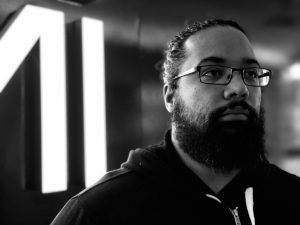
Toward the end of John Thordarson’s video, he recalls how someone once asked his mother, “Why did you want to marry a white man?” She responded, “I didn’t. I wanted to marry Paul.”
Her words reflect the heart of the Church’s response to racism: seeing a person as an image of God, not a composite of external characteristics.
As several black Catholics have emphasized, that response begins on the inside, with a habit of sincere prayer and self-reflection. It must then extend outward, through our personal dealings with others and our community engagement.
“We can only bear fruit if we stay connected to [Christ] the Vine,” said Brown. “And all of our actions need to be an outgrowth of our connectivity to the Vine.”
Whatever challenges in prayer, conversations, or political endeavors lie ahead, Brown observed that the Catholic faith continues to offer hope and guidance. “The opportunity is to recognize that in Christ, we have the most freeing and liberating force in history,” he said, “and we can unleash this force of freedom and liberation all over the country and share it with our brothers and sisters.”
In the end, just as the message of Christianity stems from a relationship with Jesus Christ, the healing message of the Church stems from our relationships with others. “The only way to recover that [joy] is people, individuals,” said Paul Thordarson. “Get to their individual stories.”
